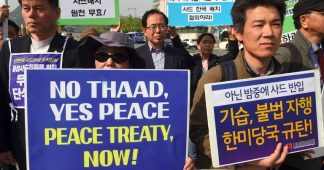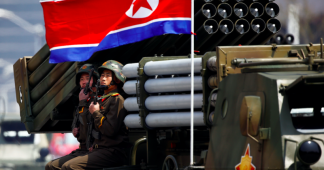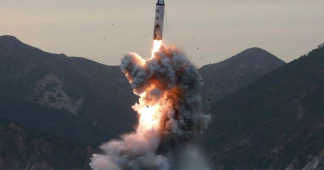Published by sputniknews.com
Seoul has announced a delay on an environmental impact test that is part of the rollout of the Terminal High Altitude Area Defense (THAAD missile defense system). The postponement has come as the result of protests by residents where the THAAD platform is to be deployed.
On Thursday, South Korea’s Ministry of National Defense (MND) and Ministry of Environment intended to survey the levels of noise and potentially harmful electromagnetic radiation emitted by the THAAD platform, which is to be rolled out in a golf course-turned-military base not far from the village of Seongju in southern South Korea. The survey was expected to attract national and local government officials, along with experts and the media.
But when the officials went to participate in the test, they found the road blocked by about 100 residents, activists and university students. Unable to disperse the protesters, the officials attempted to fly into the base using helicopters. However, poor weather conditions forced them to turn back.
“The small-scale environmental impact study on the U.S. Forces Korea’s deployment of THAAD, planned for today, is postponed because we need additional cooperation of nearby residents and civic groups,” the MND said in a statement on Thursday. “We will reschedule the survey. It is regretful that we have to rearrange the session due to unfortunate circumstances despite the ministry’s explanations and requests.”
The protests were borne from a disagreement between Seoul and locals over the extent of the environmental impact survey. The Thursday survey was to be a “small-scale” study of already-deployed components as well as a general environmental assessment for the entire site. This would take between three and four months and not require a withdrawal of the THAAD platform already in place.
But the locals have demanded a much more comprehensive Strategic Environmental Impact Assessment, which would take 12 to 15 months to complete and force the American-made anti-missile system to be withdrawn.
“The Ministry of National Defense is pushing for a small-scale environmental impact study instead of a strategic one, because it wants to avoid the possibility that the Seongju golf course is ruled unfit for the THAAD deployment,” the protesters said in a statement. “The ministry also neglected to listen to local residents’ opinions. They are trying to complete the deployment without due process.”
“The Moon administration should have stopped the ministry from planning and conducting a small-scale environmental study from the beginning,” the statement went on to say. “It must stop all moves that will justify the small-scale survey and stop the operation of THAAD and related construction work. We demand that the Moon administration remove the THAAD system from Seongju first and conduct a strategic environmental study.”
A THAAD system consists of six missile-launching platforms, each equipped with eight interceptor missiles, a firing control mechanism, a communication unit and a radar. Two of the 6 THAAD platforms have already been deployed, but the other four were delayed after the election of liberal South Korean President Moon Jae-in in May.
However, after a pair of North Korean ballistic missile tests in July, Moon okayed the deployment of the rest of the THAAD platforms after a small-scale environmental study, revised from the comprehensive one Moon had initially wanted.
In addition to the Thursday roadblocking, a group of about 300 university students gathered for a protest in Seongju. The protesters were members of Handareyeon, a leftist group that is the largest student organization in the country.











